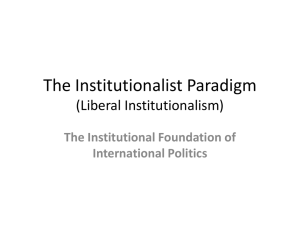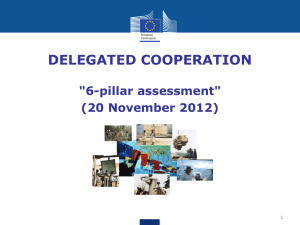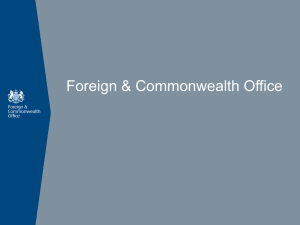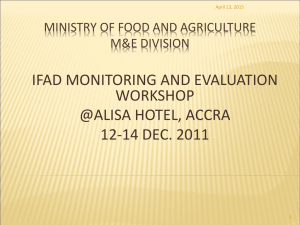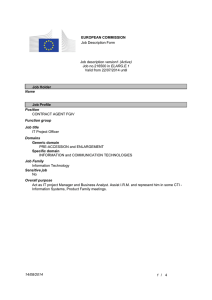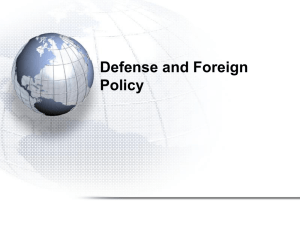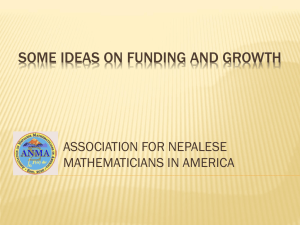2-Diplomatic Code of Conduct
advertisement
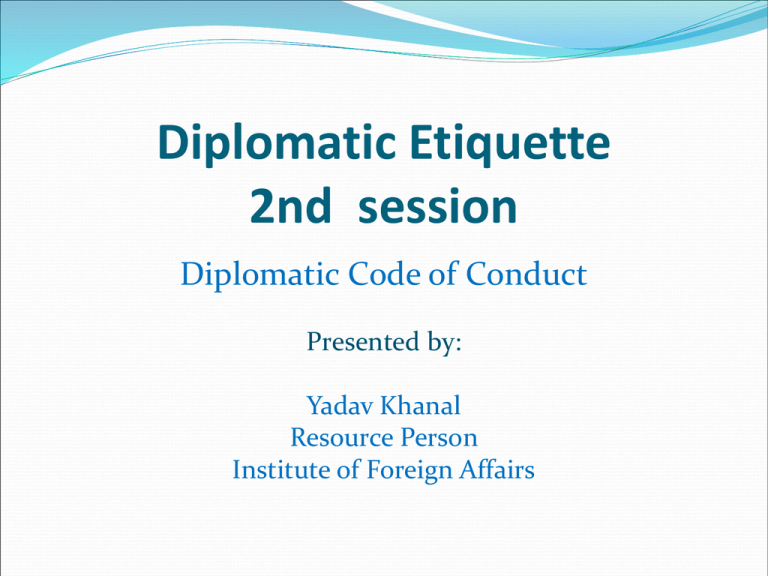
Diplomatic Etiquette 2nd session Diplomatic Code of Conduct Presented by: Yadav Khanal Resource Person Institute of Foreign Affairs Diplomatic Code of Conduct Objectives: Code of Conduct is introduced to ensure more systematic and dignified conduct of Government's official’s during meetings, contacts, negotiations, communications etc. with foreign governments /officials international organizations, their representatives and other officials consistent with diplomatic norms international practices Diplomatic Code of Conduct contd. 2 Code . is applicable to: • Person holding public office: • Everyone exercising public authority or responsibility • Nepalese missions abroad: • Nepal based Foreign Missions International organizations International Non-Governmental Organization Foreign Diplomats Administrative and Technical Staff of the Missions Local Staff belonged to Nepalese or foreign missions Diplomatic Code of Conduct Contd. 3. Observance of the Code of Conduct: This Code of Conduct shall apply to persons holding public office and officials drawing remunerations and perks from the State Treasury. It is the duty of all concerned to observe this code of conduct. Diplomatic Code of Conduct Contd. 4. Courtesy calls, • • • • • official talks and meetings: MOFA representative to be invited during the meetings between Nepalese authorities and Foreign dignitaries MOFA representative to prepare the record of talks. In the absence of MOFA representative, the concerned agency should prepare the record of talks and share with MOFA. Summary of report of meetings held by MOFA officials should be sent to the Office of the Prime Ministers and Council of Ministers. Nepal Government's ministers, officials of the constitutional bodies or other senior officials should give prior information to the MOFA while receiving foreign diplomats and other officials for courtesy or farewell calls, formal talks and meetings. Summary report of the talks and discussions should be made available to the PMO and MOFA. Diplomatic Code of Conduct Contd. • Such meetings should be held with the foreign officials of the appropriate rank. • MOFA and Nepalese missions abroad should arrange for such meetings upon advance request from the concerned agencies. The official concerned should seek the advice of MOFA on background information and matters to be raised during such talks and it is the duty of MOFA to provide necessary suggestion to that effect. • Nepalese Honorary Consuls General or Consuls should inform MOFA and concerned missions about matters relating to Nepal and Nepalese citizens. • Diplomatic Code of Conduct Contd. 6. Agreements, Commitments and Diplomatic Correspondence • While concluding agreements or understandings of any kind with foreign government or regional or international organizations, Prior approval should be taken and MOFA's participation to be ensured. Commitments made must be communicated to the MOFA as soon as possible. • Annual progress report of the performance of the Nepalese diplomatic officials and representatives abroad should be prepared and submitted by MOFA to PMO within 3 months of the next fiscal year. • Concurrence of MOFA shall have to be obtained before inviting foreign government counterparts to visit Nepal. • Correspondence done on behalf of the Government of Nepal with foreign missions and governments as well as international and regional organizations must be sent through MOFA or Nepalese Missions abroad. Diplomatic Code of Conduct Contd. 7. Foreign visits, Representations, Presentations and Reporting: • Any address, speech, remarks or statements to be made by Nepalese delegations abroad must be consistent with the policies of the GON. MOFA's opinion should be sought in respect of the policy position. • Concurrence of MOFA must be obtained before submitting proposals to the Cabinet on matters requiring MOFA to issue credentials. • Correspondence on such visits should routed through MOFA. • Every Nepalese delegation led by an official of or above the gazetted special class visiting abroad on official business must, as far as possible, include representatives from the Nepalese missions concerned and the MOFA as necessary. • Persons holding public office must use the kind of passport as specified in the Passport the and the Passport Rules while visiting abroad on official business. Diplomatic Code of Conduct, Contd. 8. Language and Dress Code: • National dress or formal attire/or decent dress should be worn in formal ceremonies and other occasions. • All personnel working at MOFA and Nepalese missions abroad should behave with courtesy and wear suitable and decent attire. • Courteous and decent language should be used during contacts and communications with the foreigners. In case English language interpreter is needed, MOFA may be approached Diplomatic Code of Conduct Contd. 9. Conduct of Diplomatic Functionaries or those holding such responsibilities • Diplomatic functionaries should conduct in accordance with international standards/ and internally accepted diplomatic norms, values and practices. • No abuse of diplomatic privileges and immunities. • Heads of Nepalese diplomatic missions or their spouses or diplomatic officials should not hold any position of benefit or engage in business activities. • Diplomatic bag should not be used for private purpose. Diplomatic Code of Conduct Contd. 10. Other Diplomatic Norms No statement or materials issued which is detrimental to the existing relations of Nepal with friendly countries. No charging of any fee or money to Nepalese or foreign nationals except provided by the existing laws. Record of income and expenditure of funds should be maintained in a transparent manner and their statements to be sent to MOFA regularly. Prior approval of MOFA should be obtained while creating and maintaining welfare funds in the Missions abroad for the rescue of Nepalese workers, and their statements to be maintained in a transparent manner. The receipt of any salary, allowance, insurance or blood money payable to the Nepalese workers abroad or their legal heirs should be sent through MOFA and the MOFA shall arrange to handover the money to the persons concerned. MOFA to submit an annual report of compliance of this Code of Conduct to the Council of Ministers. Diplomatic Code of Conduct, Contd. 11. Prohibited Acts (Don'ts) for individual holding public offices and those drawing remuneration from the national treasury: • Sharing of confidential and sensitive information to foreigners • Leak of information • Issuance of public notice on conduct of foreign relations except by • • • • • authorized person Acceptance of gifts, donation, grant, loan, remuneration or any special favor from foreigners Be a partner or an associate in the establishment, registration or management of any foreign company or organization. Accept any full or part time outside job supported and endorsed by foreign missions or diplomats sharing of personal information such as marital status, age and so on. seek personal invitation or financial assistance from any foreign missions or international organizations or NGOS. Diplomatic Code of Conduct Contd. • Make unauthorized correspondence or contact/ commitment or • • • • • • • • • representation with foreigners or foreign organizations/missions Make false claim of official status and authority with foreigners/diplomats Accept invitations or deliver speech not relevant to one's own duty and responsibility. Abuse of authority to mete special favour to any foreign diplomats correspond with foreign organizations or countries not recognized by GON. Establish undignified contacts with foreigners Accept any foreign decoration, medal etc without prior approval of GON. Use of foreign diplomats or agencies to put undue pressure on GON officials for personal benefits. Oppose prevailing laws and official policies of the GON. Enter into the chancery or residential premises of foreign diplomatic missions based in Nepal except for formal programs. Diplomatic Code of Conduct Contd. 12. Monitoring Committee High Level Monitoring Committee headed by Foreign Minister Standing Monitoring Committee headed by Foreign Secretary Monitoring Committees can hold meetings as and when necessary Diplomatic Code of Conduct, Contd. 13. Miscellaneous Officials of the Rank of Special Class or above from the Office of Prime Minister’s Office may inspect the work of the Nepalese Missions abroad. Written report may be submitted to the immediate supervisors as and when such inspections take place. Thank You !
